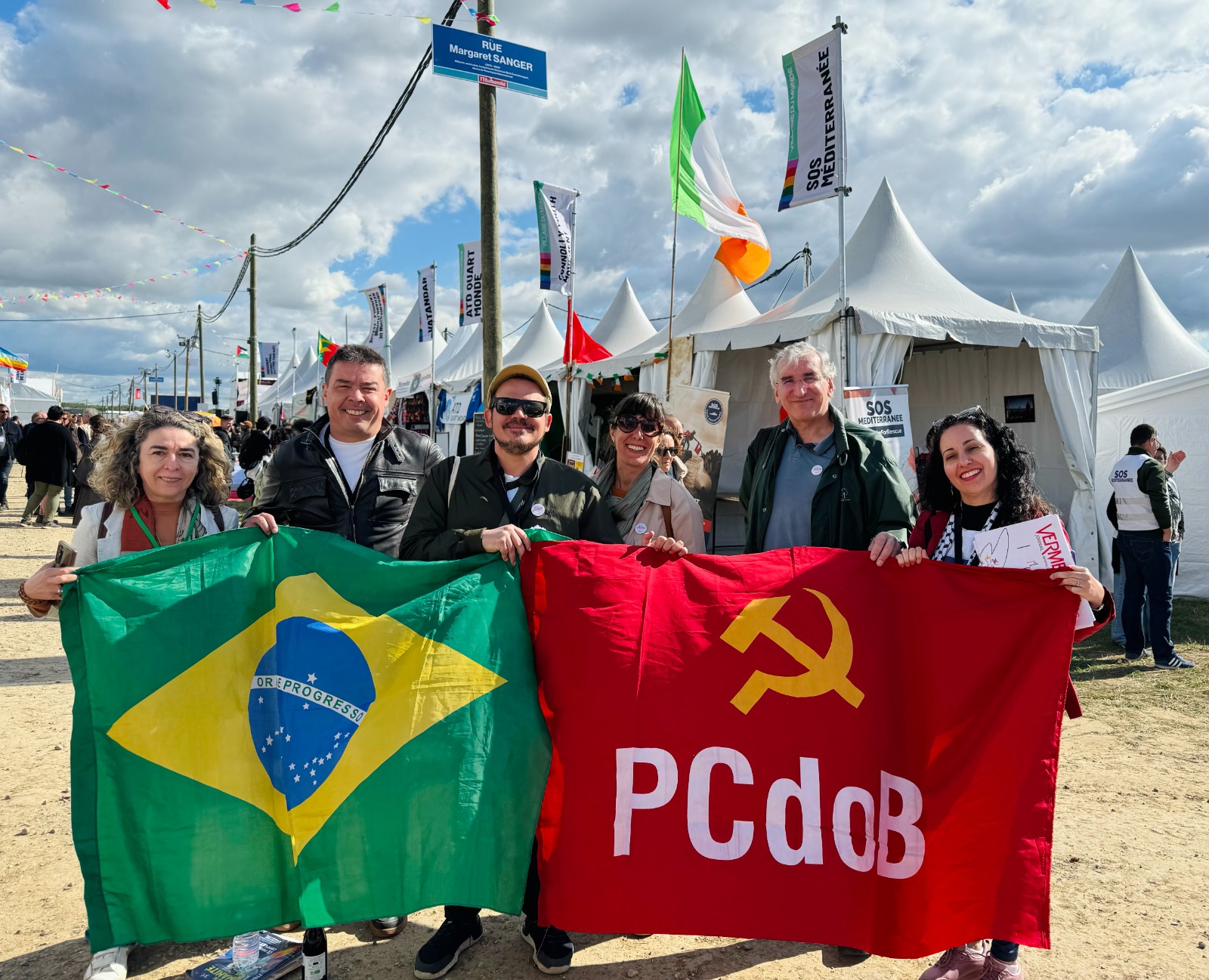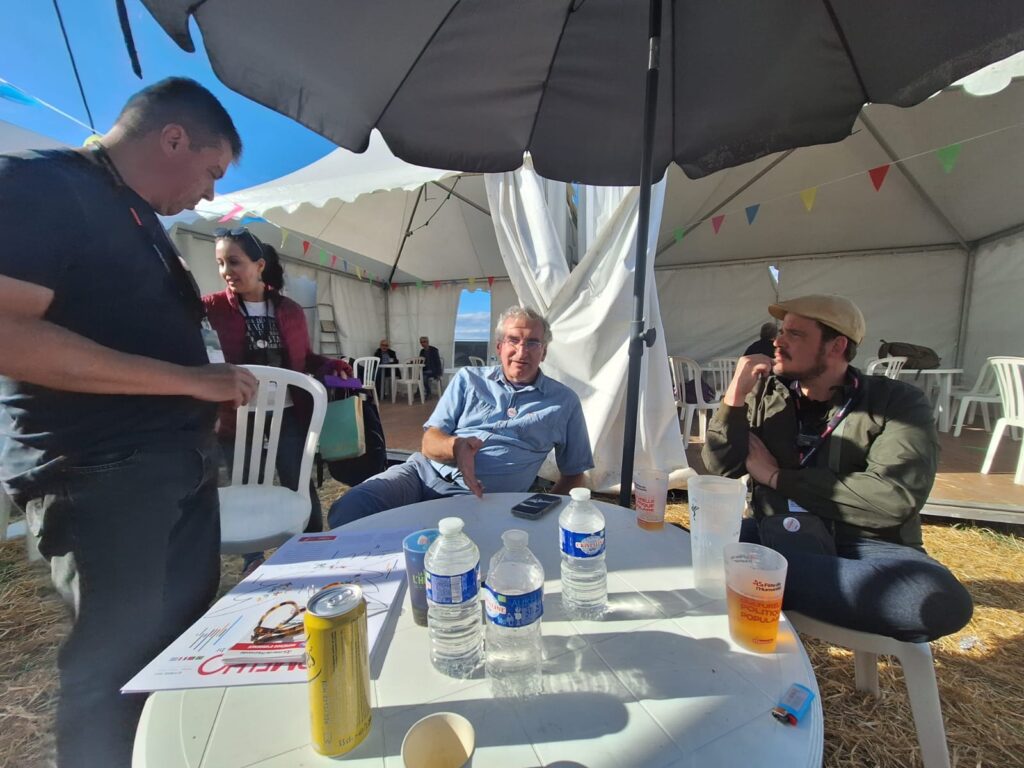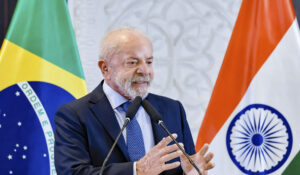
Published 20/09/2024 09:29 | Edited 20/09/2024 10:06
Parisian Henri Blotnik, 66, is a retired biologist, descended from a family of communists and left-wing activists, a member of the French Communist Party since his adolescence and currently serves on the PCF’s International Relations Committee, in addition to being part of the party’s grassroots cell in his neighborhood.
An old acquaintance of Brazilian comrades, Henri has been a kind host to communists in France for decades, particularly opening the doors of the Fête de l’Humanité.

Henri visits our country frequently. His partner, Bia, is a member of the PCdoB in Cachoeira do Sul (RS) and together they alternate between Brazil and France. Fluent in Portuguese, Henri is a profound connoisseur of Brazilian history and culture, and closely follows the national situation.
Receiving a significant Brazilian delegation at this edition of the Fête de l’Humanité, Henri gave us this interview where we were able to talk about Brazil, France, the Festival and the political and cultural significance of holding this event for the French Communist Party. Check it out below.
What is the meaning and political sense of this edition of the Fête de l’Humanité in light of the current political situation in France and the world?
The most obvious political context is the growing danger of a power-hungry far-right, with the media, financial and political support of our oligarchs. In the last election, the French people managed to deflect the far-right’s shot, thanks to the mobilization of the left-wing electorate and the republican consciousness that led voters, the citizen base, to concentrate their votes in the second round on any candidate who could face and defeat the far-right candidates.
It is a context, therefore, that causes a certain relief, but President Macron’s option to seek the continuity of neoliberal policy in alliance with the right and with the approval of the far right distorts the result of the polls.
Now, after the Olympic Games and the summer holidays, the Fête de L’Humanité marks the return of the fighting season. And starting with a party, where the anti-fascist and unitary spirit of the New Popular Front (NFP) is part of the tradition, seems quite natural. To take a breather for the struggles to come, participating in the meetings, debates, fraternizations, food and drinks that characterize this festival.
What are the main characteristics of this Festival, which will reach its 100th anniversary in 2030?
The daily newspaper L’Humanité, since its birth in 1904, has always needed the support of its readers and the party to exist. After the First World War, around 1926, support committees were formed, soon called CDH (Committees for the Defense of Humanité) to organize the support and militant sales of the newspaper. These committees made joint efforts to organize events, rallies and parties.
Traditionally, throughout the year, local festivals were followed by departmental, regional and finally national festivals. Today, local festivals remain in addition to this larger, national festival.
The Festival offers a rich and diverse range of cultural, artistic, musical, theatrical and circus programmes, a fair of progressive book and magazine publishers, a scientific space incorporating the themes of the technological revolution, and an international space where progressive parties, movements and newspapers from dozens of countries are represented.
In addition to the general party program, each tent presents its own program, with cultural activities, debates and gastronomic options from its region or country.
What parallel do you see between the current situation in France and the situation in Brazil?
The French see a left in Brazil that, despite being a minority in parliament, managed to form a government with a charismatic president, promoting public policies and distancing itself from neoliberal dogmas. Here, we would also like to see Brazil, even though we are a minority in the National Assembly, govern and implement the essential measures of the program presented by the New Popular Front (NFP) in the last elections. The French are always keenly interested in current political events in Brazil.
How do you evaluate the PCdoB’s initiative to promote the Red Festival since 2022? In your opinion, how can the party benefit from promoting political-cultural events of this nature?
Festivals, both local and national, can be a pleasurable front for mobilization for activists and a unique stage for leaders, placing the Party in an indisputable leading role. It generates recognition and a sense of collective power for everyone, as the [ escritora norte-americana ] Angela Davis, honored in this edition.
How important is the Festival for the PCF’s annual schedule?
The Festival is undoubtedly the event that marks the end of the summer holidays, we have the return to school, return to work and the return of social and political mobilization with the Festival.
What is the role of international delegations at the Festivals?
The Festival is a great opportunity for encounters and discoveries. In an environment of fake news, silence, misinformation and confusion organized by the dominant media, the presence of international delegations is important to delve deeper into issues related to the situation in each country. In addition, the meetings, debates and spaces provided by international delegations are greatly appreciated by participants and are part of the attractions of the festival.
What is the strength of women at the Festival?
There are stalls for women’s and feminist organizations, but women’s presence is evident both in the public and as activists at the stalls, as artists and as leaders on stage. This year, in addition to the participation and tribute to Angela Davis, we can highlight the presence of Sophie Binet, Secretary General of the General Confederation of Workers (CGT), alongside Lucie Castets, presented as the candidate for Prime Minister by the NFP.
What is the relationship between the newspaper l’Humanité and the French Communist Party in the construction of the Party?
Today, the newspaper takes the initiative to hold the Festival, organizing the cultural program, ensuring the availability of an appropriate space, the logistical elements (water networks, electricity, Internet, etc.), taking care of the main stages (3 large performance stages, 1 debate stage, 1 circus tent) and other technical management areas, service areas, health posts, etc.
Obviously, thanks to this infrastructure, the newspaper offers spaces to progressive associations, unions and left-wing parties in the Village du Monde (World Village), Village du Livre (Book Village) and other areas of the festival. The largest number of stalls are made up of PCF organizations at all levels, local, municipal or departmental and regional companies, which give the festival its militant character. The Fête de L’Humanité remains the fruit of the collective effort of French communists, present behind the bars, in the kitchens, serving at the tables, but also leading the debates, at the events and with the public, encouraging membership.
Each stall presents its own programme of activities, entertainment, meetings, debates, concerts, dances, etc., and mobilises dozens of activists. The newspaper L’Humanité also selects volunteers for the Festival, most of whom are young comrades or supporters of the party.
Therefore, to ensure the success of the Festival, the relationship between the newspaper and the PCF remains close.
Source: vermelho.org.br

